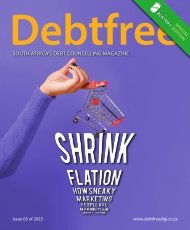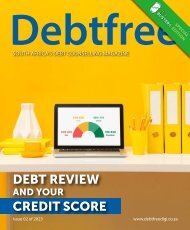August 2021 IDM Special Edition
You also want an ePaper? Increase the reach of your titles
YUMPU automatically turns print PDFs into web optimized ePapers that Google loves.
This is according to the DebtBusters’ <strong>2021</strong> Q2 Debt Index, which tracks<br />
client trends quarter-on-quarter and over the past five years.<br />
In the second quarter enquiries about debt counselling increased by 18%<br />
compared to a year ago. Benay Sager, head of DebtBusters, attributes<br />
this to the after-effects of the nationwide lockdown and a narrowing of<br />
consumers’ ability to borrow.<br />
He says that the debt levels have increased substantially and the number<br />
of open accounts have decreased for consumers applying for debt<br />
counselling, both of which indicate that consumers are seeking help<br />
sooner.<br />
The pool of consumers borrowing has also shrunk, as supported by<br />
National Credit Regulator data, which indicates average unsecured loan<br />
size has increased by 46% and number of loans has decreased by 31%<br />
over the last four years.<br />
Compared to the same period five years ago the Debt Index found:<br />
• Real income is declining as inflation continues to bite: Nominal<br />
incomes were, on average, 3% higher than in Q2 2016, but when<br />
cumulative inflation growth of 24% is factored in, real incomes have<br />
shrunk by 21%.<br />
• The debt-to-net-income ratio is at an all-time high: Consumers<br />
enquiring about debt counselling are spending around 60% of their<br />
take-home pay to service debt. More concerning is that across all<br />
income bands the debt-to-income ratio is now at 122% and 152%<br />
for those taking home R20 000 or more.

















